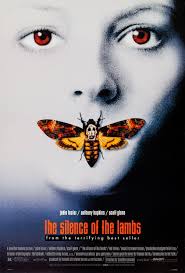1991 Jonathan Demme’s The Silence of the Lambs was released to great commercial and critical success eventually winning 7 Academy Awards including a sweep of the ‘Big Five’ some only three films have accomplished.
In addition to accolades the film also drew protests and criticism directed towards the film’s serial killer antagonist Jame Gumb. Protesters picketed theaters and there were even concerns that the national broadcast of the Academy Awards ceremony might be disrupted. The fictional Gumb stalks, abducts, kills, and skins women in pursuit of making a ‘woman suit’ to fulfill a twisted and erroneous self-image as a transsexual. The script goes out of its way to lay out that  Gumb is not a transsexual but rather his distorted self-hate had created the self-deception. Furthermore, the audience is informed that Gumb was not born a monster but made one by years of systematic abuse. Something very true of serial killers. Both the transsexual and homosexual communities presented grave concerns that the character perpetuated harmful, disparaging, and untrue stereotypes about gay and trans people. Such a viewpoint is quite understandable given cinema’s history with the gay community and their frequent depiction as dangerous deviants. I will leave it to the reader to determine for themselves if the script did enough to separate the character of Jame Gumb from the hurtful stereotype. What is important to this essay is that there were public protests about this character and the man he was depicted.
Gumb is not a transsexual but rather his distorted self-hate had created the self-deception. Furthermore, the audience is informed that Gumb was not born a monster but made one by years of systematic abuse. Something very true of serial killers. Both the transsexual and homosexual communities presented grave concerns that the character perpetuated harmful, disparaging, and untrue stereotypes about gay and trans people. Such a viewpoint is quite understandable given cinema’s history with the gay community and their frequent depiction as dangerous deviants. I will leave it to the reader to determine for themselves if the script did enough to separate the character of Jame Gumb from the hurtful stereotype. What is important to this essay is that there were public protests about this character and the man he was depicted.
Pulp Fiction released three years 1994. A collection of sensationalist short stories connected by a common collection of characters Pulp Fiction also garnered commercial and critical success winning one Academy Award for its screenplay and the Palme d’Or at the prestigious Cannes Film Festival.
In episode 5 of the film, The Gold Watch, boxer Butch, on the run from the mob after not throwing a fight he had been bribed to fix, finds himself and the local mob boss, Marsellus Wallace, captured and imprisoned in the basement of a pawn show by Maynard and Zed.
Maynard and Zed abduct, rape, and enslave unwary men and Butch and Marsellus are their next victims. While the pair are busy raping Marsellus, Butch breaks free, kills Maynard, and leaves Zed to the torturous death Marsellus plans for the rapist.
Pulp Fiction faced no protests over the psychopathic raping homosexuals characters of Maynard and Zed. No picket lines outside of theaters, no threats that might derail the live broadcast of the Academy Awards. Maynard and Zed inspired none of the outrage seen just a few years earlier with the character Jame Gumb.
Why?
There’s no genius, albeit criminal, psychiatrist explaining that Maynard and Zed are the products of cruel systematic abuse. There’s no backstory, no establishment of the history to serve as a reason for their horrific acts. The pair are presented fully formed, without comment or elaboration, and no one protests.
There is something that makes these two characters stand out from every other character in the film. Despite the film being set in Los Angeles Maynard and Zed from the moment they speak their first word are identifiable as southern. And there lies the answer to the lack of outrage and protest.
Their southern identities are the dominate ones overriding all other associations and characteristics. Harkening back to the classic adventure film Deliverance all manner of sadistic behavior can be explained with an accent. Characters speaking in such a manner can be stupid, cruel, or rapists, and it is simply accepted as true their nature.
Both The Silence of the Lambs and Pulp Fiction are masterworks of cinema, and both reside in my library, but it is always instructive to examine what we accept without question.
